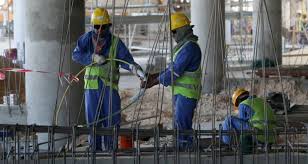By Andrew Warshaw
March 18 – In a week when the 2022 World Cup in Qatar will take centre stage as FIFA announces the exact November-December dates, the country has again pledged to push ahead with reforming its controversial ‘kafala’ labour system – but has stopped short of presenting a timetable for when this will happen.
Abdullah Saleh Mubarak Al Khulaifi, Qatar’s minister of labour and social affairs, was quoted by local media as saying there would be no going back on a promise to change the law but that he couldn’t give a more precise time scale.
Qatar expects to more than double the number of labourers to 2.5 million by 2020 and whilst the minister’s comments could be construed as an honest appraisal of the situation, they seem bound to be seized upon by Qatar’s critics and human rights bodies as further indication that there is insufficient commitment to reform to the controversial kafala system that ties migrant workers to their employer ‘sponsors’.
They also appear to contradict assurances FIFA president Sepp Blatter claims to have been given by the Emir of Qatar last weekend ahead of this week’s FIFA executive committee session in Zurich. Blatter welcomed such assurances but said after his private meeting that Qatar still needed to do more over the vexed issue of workers’ rights.
Last year, the Qatari government unveiled draft proposals to ease restrictions on foreign workers leaving the country by introducing employment contracts and an electronic payment system but did not repeal kafala.
Speaking at a Foreign Ministry event in Doha, Al Khulaifi was quoted as saying: “Qatar has fulfilled all its legal obligations in the past and will do so in the future as well,” adding that the term “sponsorship” would also be abolished under the new legislation but saying he couldn’t provide more details.
Speaking at press conference last month, Human Rights Watch researcher Nick McGeehan was quoted as suggesting Qatar’s “very influential business community” may be one reason for the delay in approving reforms. “Perhaps there has been an underestimation of the local opposition,” he told reporters.
Contact the writer of this story at moc.l1743772973labto1743772973ofdlr1743772973owedi1743772973sni@w1743772973ahsra1743772973w.wer1743772973dna1743772973

